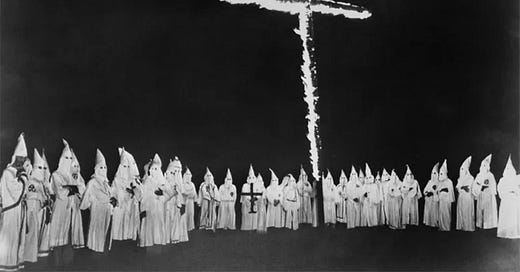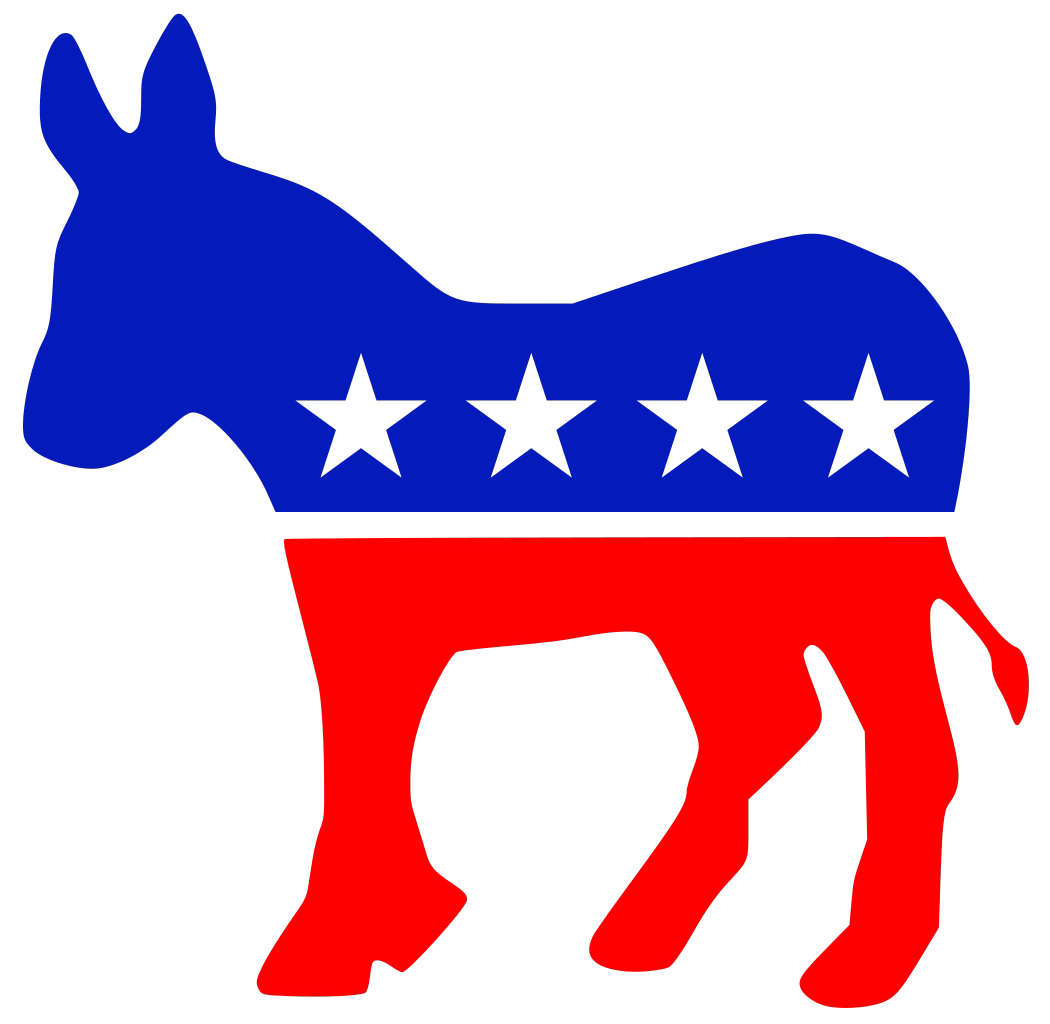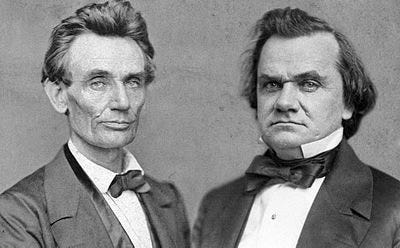The Ugly History of the Democratic Party
If we should reject organizations that have histories of racism, then we should begin by rejecting the largest and oldest of all racist organizations in the United States: The Democratic Party.
Other than the few instances when the Constitution can be useful either in helping a progressive Democrat (such as when Bill Clinton is being impeached) or hurting a Democrat-turned-Republican (like Donald Trump being impeached), progressives tell us that for the most part we should ignore the Constitution.
Whether creating new progressive subsidy programs, or authorizing unelected bureaucrats to issue edicts and regulations that are binding on citizens and have the power of law, or celebrating contrived “abortion rights,” progressives demand that the Constitution should not get in our way.
So these things are unconstitutional—so what? We are a postmodern people who follow our passions and desires. We do what we want. If the Constitution poses any kind of problem or obstacle, just ignore it. That’s what they tell us.
Why? One important reason, progressives insist, is that the Constitution is a racist document, part of the racist history of the racist United States.
There are a couple of mostly-unspoken premises underlying their position: First, racism is wrong. Or, perhaps to be more precise with our words, progressives seem to believe that the wrong kind of racism is wrong, which mainly means the kinds of racism they dislike. In many instances, they’re quite eager to embrace what they find to be the right kind of racism, thinking the rest of us won’t notice the contradiction.
Show me a progressive who assumes black people are just as capable as all other people of obtaining some form of identification—or passing a math class, or using a website, or learning English grammar, or creating wealth for themselves by producing value for others, or controlling their anger and other emotions—and I will show you someone who’s not really a progressive.
The second premise for the progressive rejection of the Constitution—often connected to a rejection of America itself—is that laws, institutions, and organizations with a history of racism are not morally binding on us, today, because we, today, are better than that. We, today, are not racist, so why should we be obligated to follow laws, institutions, and organizations that have histories of racism?
In another issue of Liberty Lyceum, we’ll address the question, in detail, of whether the Constitution is actually a racist document or not. For now, however, let us agree with our progressive friends, relatives, and fellow citizens.
Yes, you read correctly.
Let us agree that we today are not racists and therefore we are not only not obligated to follow laws, institutions, and organizations that have histories of racism, we should openly reject them.
What, then, does that mean for the Democratic Party?
Progressives & The Democratic Party
Let us here clarify some key terms. By American progressives we are referring to fellow U.S. citizens who embrace the German model of a modern society that is centrally planned and socially engineered by scientists and other experts who wield regulatory control over non-experts. (I’ve written on the German-connection here and here.)
In our age, progressives overwhelmingly flock to the Democratic Party more than any other single institution. Progressives might be male or female, white or black, they might be Catholic or Methodist or Jewish or atheist, they might work in Hollywood or corporate America or a university or the media or professional sports, they might get sexually turned on by men or women or both or those who insist they are neither, but they’re overwhelmingly Democrats.
Not all, though.
While virtually all Democrats are progressives, not all progressives are Democrats. There are progressive Republicans, for example.
Why do you think Richard Nixon created the Federal Pay Board and Price Commission (often combined and referred to as the Federal Wage & Price Commission)? He was a progressive.
Why did Bush Senior raise taxes rather than insist on reducing government spending? He was a progressive.
Why did John McCain author the most sweeping legislative restriction on free speech and private property rights in American history? He was a progressive.
Why does Donald Trump think he can plan the United States economy through tariffs, spending, and other government policies? He is, to a large extent, a progressive.
There are also progressives who flirt with the Green Party and other third parties because they think both the Republican and Democratic Parties are not progressive enough.
Still, by and large, the one organization that attracts the loyalties, allegiance, and financial support of the largest numbers of progressive Americans is the Democratic Party, hands down.
The Democratic Party is home of the progressive movement.
So let us remind ourselves that, for now, we are agreeing with our progressive friends, relatives, and fellow citizens: We modern Americans should not be obligated to follow laws, institutions, and organizations that have histories of racism. We should openly reject them.
Shouldn’t we, then, openly reject the Democratic Party?
Some Democratic History
The Democratic Party is old. It is the oldest political party in the United States. It is now nearly 200 years old. The origins of the modern Democratic Party stretch all the way back to the election of 1828, when supporters of Andrew Jackson formed a political organization and infrastructure, the Democratic Party, to avoid a repeat embarrassment of 1824, when Jackson lost to John Quincy Adams in a highly-charged, controversial election.[1]
An ancient maxim holds that how something begins is how it tends to go, over time. If that’s true, it’s more than interesting that the modern Democratic Party began with Andrew Jackson.
Jackson was a man driven by hatred. He hated Indians more than he hated black people; he hated the United States Bank and everyone involved with it more than he hated Indians. He hated John C. Calhoun’s wife probably as much as he hated the bank. It’s impossible to understand the life and political career of Andrew Jackson without understanding everything and everyone he hated.
It should come as no surprise, therefore, that throughout its long history, the Democratic Party has always focused on the Americans it dislikes, opposes, or hates. Over the course of two centuries, the Democratic Party has never advocated for the equal protection of the laws for the equal individual rights of each and every individual citizen.
Not once. Ever.
Throughout its long history, the Democratic Party has consistently divided citizens into groups, offering to use the power of government to help some while placing unjust burdens on others. The only thing that has changed, over time, are the groups that benefit from crony Democratic favors versus the groups that suffer the wrath of the Democratic Party. Whichever groups are in or out at a given moment, Democratic politics is always group politics, or identity politics—goodies for some, not for all.
The history of the Democratic Party is a history of high-profile race-mongers, Andrew Jackson being merely the racist founder of the Democratic Party. Many more prominent racists came after Jackson, including Stephen A. Douglas, John C. Calhoun, Roger Taney, Woodrow Wilson, Robert Byrd, and Lyndon Johnson, among many others.
To pick out just one of these examples, let us hear from Stephen Douglas, the most prominent Democrat in the 1850s, a long-time United States Senator who would’ve become President if it wasn’t for the Democratic Party’s fanaticism over racism and slavery.
Like Democrats today, Democrat Douglas was pro-choice, only not about abortion, but slavery. Douglas argued repeatedly that white people who want black slavery possess a “sacred right” to choose legalized slavery. He said over and over that he “don’t care” if slavery is voted up or down by white people.
The Democrats who turned against Douglas opposed him because they thought slavery was a positive good, something that should be required and protected by law everywhere, not subject to an up or down vote by the people. Let that sink in.
Some will remember that Democrat Stephen Douglas debated Republican Abraham Lincoln, several times, in the Fall of 1858. In the first of the debates, held in Ottawa, Illinois, here’s what the spokesman for the Democratic Party said about Lincoln:
I do not question Mr. Lincoln’s conscientious belief that the negro was made his equal, and hence is his brother, but for my own part, I do not regard the negro as my equal and I positively deny that he is my brother or any kin to me whatever.
Here is Douglas again, also from the first joint debate:
Lincoln holds that the negro was born his equal and yours, and that he was endowed with equality by the Almighty, and that no human law can deprive him of these rights which were guaranteed to him by the Supreme ruler of the Universe. Now, I do not believe that the Almighty ever intended the negro to be the equal of the white man. If He did, He has been a long time demonstrating the fact. For thousands of years the negro has been a race upon the earth and during all that time, in all latitudes and climates, wherever he has wandered or been taken, he has been inferior to the race which he has there met. He belongs to an inferior race and must always occupy an inferior position.
There’s much more like this not only from Stephen Douglas, but from many other prominent Democrats spread out over large periods of time. Sentiments like the ones above are not outliers in the history of the Democratic Party. They are the norm.
The Democratic Party was the largest and most influential national organization that supported slavery before the Civil War and race-based domestic terrorism after the Civil War. The Ku Klux Klan was the paramilitary unit of the Democratic Party.
The Democratic Party gave to Americans lynchings and Jim Crow, and later race-based affirmative action and identity politics.
One of the most famous of all Democrats, Franklin D. Roosevelt, bought the votes of millions of Americans with unconstitutional spending programs—presented as “entitlements” and “free” housing, education, and health care—but not black Americans. If you were hungry and black in the 1930s or 40s, you might receive a handout from one of FDR’s New Deal programs, but most likely you wouldn’t.
Throughout its long and sad history, the Democratic Party, as a national political organization, has consistently rejected the principles of the American Founding—the principles enshrined in our Declaration of Independence—while embracing forms of domestic political tribalism, winning the loyalties of some Americans through sheer political bribery, and others by persuading them that their greatest enemies are their own fellow citizens who are not Democrats.
Reparations?
If anyone is responsible to provide reparations for slavery and historical racial injustices in the United States, it’s the Democratic Party.
From legalized slavery to Jim Crow to elected government officials participating in the racial terrorism of the Ku Klux Klan to decades of opposition to civil rights measures for Americans with dark skin color, the Democratic Party has been the single largest and longest-enduring national organization dedicated to the violent oppression of black people in American history.
Hands down. No other organization of any kind comes close.
No organization did more to resist the end of legalized slavery than the Democratic Party. During the Civil War, Democrats fought viciously, desperately, to the end, to preserve slavery and the white supremacist way of life that revolved around slavery. Large numbers of Democrats didn’t want Lee to surrender at Appomattox because they wanted to keep fighting!
The Confederate States of America was a government formed by Democrats, of Democrats, for Democrats. Say whatever one wants about Abraham Lincoln and the Civil War, this much is clear: Democrats were willing to fight to the death rather than face a future without black slavery and with citizenship coupled with equal civil rights for former slaves.
When the 13th Amendment was proposed, abolishing slavery throughout the United States, who opposed it? Democrats.
The great fear for millions of Democrats was a future in which black Americans were free to vote, hold office, sit on juries, and own and run their own businesses as they pleased. Many Democrats assumed that if black men were free, their main interest would be raping white women. See Charles Dew’s excellent little book, Apostles of Disunion.
Many Democrats today know that the racism of their own party is a matter of historical fact, so they try to pull a fast one and tell others the two major political parties “switched” in the 1960s, that what used to be the racist Democratic Party is now the modern Republican Party. This is laughably untrue, and a subject deserving its own essay—which will come, later, I promise.
We are so partisan and so divided today, that some will read this essay and conclude: “Krannawitter is suggesting that the Republican Party is perfect, a party of angels.”
No, I am not. I am suggesting no such thing.
The history of the Republican Party, too, deserves its own essay discussion. That will come. Here I will simply point out that the origins of the Republican Party are nobler than the origins of the Democratic Party.
The Republican party was formed in 1854 to stop the spread of slavery, which required stopping Democrats. Democrats at that time wanted slavery to spread all the way to California and the West Coast, and beyond. By the middle of the 19thcentury, many Democrats were looking to conquer Mexico, Central America, and numerous Caribbean island nations, all of which were populated with brown-skinned people that Democrats viewed as inferior.
When Democrats looked at maps of Central and South America, they saw endless supplies of cheap slave labor in the form of inferior races.
Let’s not forget: Among 19th century (and later 20th century) Democrats, scientific racism was the “settled science” of the day. Not long after, growing numbers of Democrats in the United States and progressives in Europe became enthralled with the hope and promise that race-based eugenics would solve most modern social problems. Only Adolph Hitler and his brutal death camps could dampen the burning progressive enthusiasm for eugenics.
The Democratic Party was founded, in 1828, to get one man elected President: The racist, black-hating, Indian-hating Andrew Jackson. However one might describe the beginning of the Democratic Party, “noble” is an adjective unlikely to be used.
The bottom line is that it doesn’t really matter if you hate Republicans today. It doesn’t matter if you hate Donald Trump. It doesn’t matter if you like the way Democrats now bribe black Americans for their votes with promises of subsidies, affirmative action, and free health care, rather than threating black Americans with KKK-style arson, rape, and lynching. There is no changing the historical fact that no organization did more to make the lives of millions of black people in the United States a living Hell on Earth, over the course of many generations, than the Democratic Party.
If we are to follow the advice of our progressive friends, therefore, and openly reject laws, institutions, and organizations that have histories of racism, we should begin by rejecting the Democratic Party. Anyone unwilling to reject that party, with its shameful and embarrassing history of racism, is more partisan than morally serious.
[1] In 1824, John Quincy Adams didn’t win the most popular votes or even a majority of state electoral votes; the election went to the House of Representatives, which eventually selected JQA as President. Andrew Jackson alleged that the entire election, including the votes in the House of Representatives, was rigged by corrupt allies of Adams and was therefore illegitimate. Jackson and his supporters formed the Democratic Party to ensure election integrity in the next Presidential election, 1828. Sound familiarly ironic?











I had this conversation with a democrat and he tried to make the point that the Republicans were the racists. Which of your books shows that the Republicans and Democrats did not switch places?